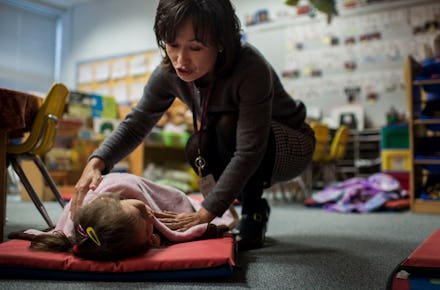Neuroscientist Paul Kelley Wants Students to Sleep in and Start School One Hour Later

The first week after Labor Day marks back-to-school week for many public-school students around the country, and with most schools starting as early as (or earlier than) 8 a.m., most of those students will be packed yawning into a bus and delivered sleepily into class.
With a starting time of 8 a.m., many students are likely rolling out of bed before 7 a.m.
But it doesn't have to be this way. Speaking at the British Science Festival in Bradford, England, on Tuesday, neuroscientist and sleep advocate Paul Kelley argued schoolchildren and their adult counterparts shouldn't have to start their formal obligations for the day until much later in the day. He suggested a start time as late as 10 a.m. for schools, rather than the U.K. standard of 9 a.m.. Such a change, Kelley said, could improve test scores by as much as 10%.
"This is a huge society issue," he told attendees, according to BuzzFeed News. "Staff should start at 10 a.m. You don't get back to [a natural 9 a.m schedule] starting point until 55. Staff are usually sleep-deprived. We've got a sleep-deprived society. It is hugely damaging on the body's systems because you are affecting physical emotional and performance systems in the body."
In 2016, Kelley will begin a University of Oxford initiative called Teensleep, intended to demonstrate his hypothesis.
According to Columbia University sleep expert James E. Gangwisch, Kelley has a point when it comes to younger children.
"Teenagers, for whatever reason, have a tendency to want to go to bed later and sleep in later. Younger kids have later start times than the older kids," Gangwisch told Mic in a phone interview. "All of these different things end up resulting in the adolescent school start times being earliest in the morning. And that's a time in their lives when they have a tendency to want to stay up later."
"Later school start times would adhere more closely to the biological sleep rhythms of adolescents," the American Academy of Sleep Medicine's Dr. Shalini Paruthi told Mic. "In puberty, a natural shift occurs in the timing of the body's internal 'circadian' clock, causing most teens to have a biological preference for a late-night bedtime."
When kids get more sleep, "they have a better ability to concentrate and focus and learn," adds Gangwisch. But adults are better suited to controlling their circadian rhythms, the 24-hour biological cycles that dictate human behavior including sleep schedules, than their younger counterparts.
"Our circadian rhythms are based more on our current social situations, our lives and work schedules and such," said Gangwisch. "I have a long commute, so for me to get to work in the morning, I have to get up a lot earlier."
However, he cautioned that older people should be careful to get enough sleep, and noted sleep deprivation has many consequences, including declining quality of work, inability to learn effectively, depression, weight gain, diabetes and car crashes.
Previous research has found significantly lower rates of car crashes in a Virginia high school district that began classes at 8:45 a.m. compared to another where school began at 7:20 a.m. One Australian study concluded drivers aged 17-24 who slept less than six hours a day were about 20% more likely to crash their vehicles.
Skipping a healthy sleep schedule has additional effects on adolescents and young people, including higher levels of day-to-day stress and increased food consumption. Sleep deprivation even causes people to underestimate how much sleep they need on a daily basis, compounding the problem.
"We live in a 24-hour society, where technology is a constant distraction. Sleep has somehow become considered a luxury that can take a back seat to other circumstances, situations and obligations in our lives," according to Dr. Paruthi. "As a society we are losing sleep due to a variety of factors. People who work long hours have less discretionary time and often sacrifice sleep for personal or family obligations."
"Among adolescents, insufficient sleep has been associated with adverse risk behaviors, poor health outcomes and poor academic performance," a CDC report released in 2015 concluded. "In view of these negative outcomes, the high prevalence of insufficient sleep among high school students is of substantial public health concern."
Sept. 9, 2015 at 6:30 p.m.: This article has been updated to include quotes from the American Academy of Sleep Medicine's Dr. Shalini Paruthi.